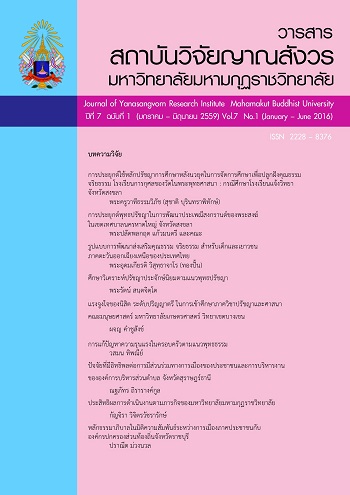Good Governance Principles in the Context of Relationship between Civil Politics and Local Administrative Organizations in Ratchaburi Province
Main Article Content
Abstract
หลักธรรมาภิบาลThe aims of this research were 1) to study the implementation of good governance principles 2) to study the level of public participation in political activities 3) to compare the implementation of good governance principles on basis of organization types and sizes 4) to compare the implementation of good governance principles on basis of personal factors 5) to study the context of relationship between good governance for working of local administrative organizations in Ratchaburi Province and civil politics 6) to study the problems and obstacles in the implementation of good governance principles and 7) to study the approach to promotion of civil politics’ participation in good governance implementation of local administrative organizations in Ratchaburi Province. This research applied mixed-method research design, which involved quantitative and qualitative methods. The sample included 440 residents within ten districts under the responsibility of twenty-six local administrative organizations in Ratchaburi Province obtained through Yamane’s determining sample size. The target group included fifty-two individuals: two executives of local administrative organizations, one political government officer, and one general governance officer. The findings revealed as follows: 1) The implementation of ten good governance principles by local administrative organizations in Ratchaburi Province was reported to be at the high level 2) the public participation in political activities was found at the moderate level in three aspects 3) the implementation of good governance principles on basis of organization types, sizes, and personal factors was different at significance level .05 4) the connective aspect between the good governance principles applied in local administrative organizations and the civil politics from statistical data significantly related at .05 of the 2 aspects : the responsiveness and the rule of law. 5) the problems and obstacles in the implementation of good governance principles included the followings: the limitations of supervisors and sub-ordinates, and budget; low public cooperation; and the auditing results from Office of the Auditor General of Thailand and 6) the approach to promotion of civil politics’ participation in good governance implementation of local administrative organizations in three aspects after priority referred to civil political pattern, auditing and election
Article Details
References
คณะกรรมการพัฒนาระบบราชการ, สำนักงาน. (2552). คู่มือการจัดระดับการกำกับดูแลองค์การภาครัฐตามหลักธรรมาภิบาลของการบริหารกิจการบ้านเมืองที่ดี. กรุงเทพฯ : พรีเมียร์โปร.
คุณากร กรสิงห์. (2550). การศึกษาเปรียบเทียบการนำหลักธรรมาภิบาลมาใช้ในองค์การบริหาร ส่วนตำบล จังหวัดนครสวรรค์. เชียงใหม่ : มหาวิทยาลัยเชียงใหม่.
ไชยรัตน์ เจริญสินโอฬาร. (2542). วาทกรรมการพัฒนา : อำนาจ ความรู้ ความจริง เอกลักษณ์และความเป็นอื่น. โครงการหนังสือเล่ม อันดับที่ 16 ศูนย์วิจัยและผลิตตำรา มหาวิทยาลัยเกริก.
ณัฐกร วิทิตานนท์ และ ธีระวัฒน์ ปาระมี. (2555). กฎหมายเลือกตั้งท้องถิ่น.(พิมพ์ครั้งที่ 2). กรุงเทพ ฯ : Sat Four.
ณรงค์ บุญสวยขวัญ. (2549). ขบวนการปฏิบัติการประชาสังคมกับการใช้อำนาจรัฐในพื้นที่ลุ่มน้ำปากพนังจังหวัดนครศรีธรรมราช. วิทยานิพนธ์ปรัชญาดุษฎีบัณฑิต คณะรัฐศาสตร์ มหาวิทยาลัยรามคำแหง.
. (2552). การเมืองภาคพลเมือง : บทวิเคราะห์แนวคิดและปฏิบัติการท้าทายอำนาจ การเมืองในระบบตัวแทน. กรุงเทพ ฯ : เอดิสันเพรส โปรดักส์.
. (2551). “พัฒนาการการเมืองภาคประชาชน : บทสังเคราะห์และข้อสังเกตปรากฏการณ์ในสังคมการเมืองไทย”. วารสารสถาบันพระปกเกล้า. เล่มที่ 6 ฉบับที่ 2 : 28-58.
ถวิลวดี บุรีกุล. (2556). การประเมินคุณภาพประชาธิปไตย : คู่มือปฏิบัติ. กรุงเทพฯ : สถาบันพระปกเกล้า.
ประภาส ปิ่นตบแต่ง. (2551). “ประชาธิปไตยทางตรงในบริบทปัญหาของประชาธิปไตยแบบตัวแทน” ใน ก้าวไม่พ้นประชานิยม : แสวงหาประชาธิปไตย ณรงค์ เพ็ชรประเสริฐ.(บรรณาธิการ) กรุงเทพมหานคร : คณะเศรษฐศาสตร์ จุฬาลงกรณ์มหาวิทยาลัย.
พรศักดิ์ ผ่องแผ้ว และ ธีรภัทร์ เสรีรังสรรค์. (2539).รายงานการวิจัยเรื่องคณะกรรมการการเลือกตั้ง.นนทบุรี : มหาวิทยาลัยสุโขทัยธรรมาธิราช.
ไพบูลย์ โพธิ์สุวรรณ. (2551). ยุทธศาสตร์การพัฒนาท้องถิ่นสู่ผลสัมฤทธิ์ กรณีศึกษาองค์กรปกครองส่วนท้องถิ่นในประเทศไทย. วิทยานิพนธ์รัฐศาสตรดุษฎีบัณฑิต คณะรัฐศาสตร์ มหาวิทยาลัยธรรมศาสตร์.
มนัส สุวรรณ และคณะ. (2546).รายงานสรุปสำหรับผู้บริหารโครงการวิจัยเรื่อง การตรวจสอบขององค์กรภาคประชาชนในระบบการบริหารงาน และกิจการสาธารณะของท้องถิ่น. เชียงใหม่ : คณะสังคมศาสตร์ มหาวิทยาลัยเชียงใหม่.
มหาดไทย, กระทรวง. (2544). หนังสือกระทรวงมหาดไทย ด่วนที่สุด ที่ มท 0318/ว 86 ลงวันที่ 12 มกราคม 2544 เรื่อง การขอซักซ้อมแนวทางการดำเนินงานตามโครงการส่งเสริมอาชีพของสภาตำบลและองค์กาบริหารส่วนตำบล โดยถือปฏิบัติตามระเบียบกระทรวงมหาดไทย ว่าด้วยการดำเนินงานโครงการเศรษฐกิจชุมชน พ.ศ. 2541 แก้ไขเพิ่มเติม (ฉบับที่ 2) พ.ศ. 2543.
มนูญ จันทร์สมบูรณ์. (2550). วัฒนธรรมธรรมาภิบาลของผู้นำท้องถิ่นและประชาชนในเขตองค์การบริหารส่วนตำบล. ดุษฎีนิพนธ์สหวิทยาการดุษฎีบัณฑิต มหาวิทยาลัยธรรมศาสตร์.
รัชยา ภักดีจิตต์. (2555). ธรรมภิบาลเพื่อการบริหารภาครัฐและภาคเอกชน. กรุงเทพฯ :วีพริ้นท์ (1991).
รัฐธรรมนูญแห่งราชอาณาจักรไทย พุทธศักราช 2540
วรเจตน์ ภาคีรัตน์. (2542). การเลือกตั้งในรัฐเสรีประชาธิปไตย วารสารศาลรัฐธรรมนูญ. ปีที่ 1 ฉบับที่ 3 (กันยายน-ธันวาคม 2542).
สมาชิกสภาผู้แทนราษฎรจังหวัดราชบุรี.(ออนไลน์) จาก th.m.wikipedia.org/wiki/สมาชิกสภาผู้แทนราษฎรจังหวัดราชบุรี เข้าถึงข้อมูลเมื่อวันที่ 12 กรกฎาคม 2557.
สุรศักดิ์ โตประสี. (2553). ธรรมาภิบาลในการบริหารงานคลังขององค์การบริหารส่วนตำบล.หลักสูตรปริญญาดุษฎีบัณฑิต (รัฐประศาสนศาสตร์). มหาวิทยาลัยรามคำแหง.
เสกสรรค์ ประเสริฐกุล. (2553). การเมืองภาคประชาชนในระบอบประชาธิปไตยไทย. (พิมพ์ครั้งที่ 3) กรุงเทพฯ : วิภาษา.
ส่งเสริมการปกครองส่วนท้องถิ่น, กรม. (2557). ข้อมูลจำนวนองค์กรปกครองส่วนท้องถิ่น. ข้อมูล ณ วันที่ 9 มิถุนายน 2557. (ออนไลน์) จาก http://www.dla.go.th/work/abt/summarize. เข้าถึงข้อมูลเมื่อวันที่ 6 กรกฎาคม 2557.
(2546). องค์กรปกครองส่วนท้องถิ่นที่มีการบริหารจัดการที่ดีตามหลักธรรมาภิบาล. กรุงเทพฯ : กรมส่งเสริมการปกครองส่วนท้องถิ่น.
สมบูรณ์ ศิริประชัย. (2542). “ธรรมาภิบาลภายใต้กระแสโลกาภิวัตน์ : นัยต่อประเทศไทย.” รัฐศาสตร์สาร. 2(30) : 4-11.
หควณ ชูเพ็ญ. (2553). โครงสร้างและภาระหน้าที่ขององค์การบริหารส่วนท้องถิ่นกับความสัมพันธ์ ในการแสดงความรับผิดชอบของการปฏิบัติหน้าที่. เอกสารประกอบการบรรยายวิชาการ ปกครองท้องถิ่นเปรียบเทียบ หลักสูตรปริญญารัฐประศาสนศาสตรมหาบัณฑิต วิทยาลัยการปกครองท้องถิ่น มหาวิทยาลัยขอนแก่น.
อรพินท์ สพโชคชัย. (2541). “สังคมเสถียรภาพและกลไกประชารัฐที่ดี (Good Governance)” ทีดีอาร์ไอ. ฉบับที่ 20 เดือนธันวาคม 2541.
Denhardt J.V. and Denhardt R.B., (2003). The New Public Service : Serving not Steering. New York : M.E. Sharpe.
Jayasuriya, K. (2005). Capacity Beyond the Boundary: New Regulative State,Fragmentation, and Relational Capacity. in Challenges to State Policy Capacity.edited by M. Painter and J. Pierre. New York: Palgrave MaMillan.
Santiso, C. (2001). Good governance and aid effectiveness : The World Bank and conditionality. The Georgetown Public Policy Review, 7 (1), 1-22.
Shimomura, Y. (2003). The role of governance in Asia. n.p.
Weiss, Thomas G. (2000). Governance, Good Governance And Global Governance: Conceptual And Actual Challenges. Third World Quarterly 2:795-814.
Williamson, O.E. (1996). The Mechanism of Governance. New York : Oxford University Press.

